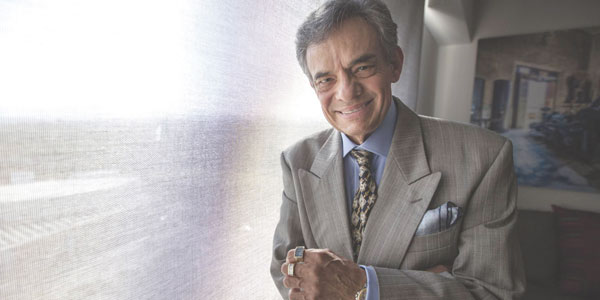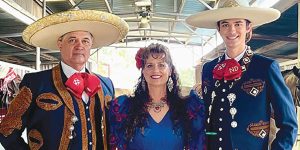
By Jorge Ramos
José José had just died and many Mexicans (as well as others in Latin America) were desperate to know more about the somber circumstances. How had the revered Mexican crooner died? Where was he going to be buried? Would there be a public ceremony in his honor? If so, when? Plenty of lies, outlandish claims and unconfirmed assertions flooded social media. Solid journalism was, truth be told, nowhere to be found.
But the story surrounding the death of José José was more complicated than people initially thought. The relatives of the performer, whose real name was José Rómulo Sosa Ortiz, couldn’t agree on even the most basic things, like where he would be laid to rest. For a couple days nobody could even say for sure where his body was.
To further complicate matters, José José died in Miami, where he lived the final decades of his life, but many of his fans were now demanding that his body be shipped to Mexico City for a posthumous tribute at the Palacio de Bellas Artes, where he had never performed.
The “Prince of Song,” as he was known, was one of the premier singers of our time in any language, though quite frankly I am tired of repeating this about him. His death was an unexpected reminder of just how deep some cultural divisions run in the United States. As countless Latinos again sang the songs that had been their companions as they grew up and fell in love, the rest of America — the English-speaking portion — never knew his work.
How can one explain José José to an American? He was our Frank Sinatra, as my journalist friend María Antonieta Collins put it. María Antonieta writes mostly about the pope, but she is also a good singer and knows all there is to know about José José, whose tunes she knows by heart.
It is wrongheaded and incredibly arrogant to think that so-called serious journalists — those that cover politics and international news — shouldn’t write about art and show business. On the contrary, politics and the arts are often linked in profound ways. Even Mexico’s President, Andrés Manuel López Obrador, knows this. Though he prefers commercial flights for himself, he authorized the transport of half the singer’s ashes from Miami to Mexico, on a Ministry of Defense plane, in time for the memorial at the Palacio de Bellas Artes on Oct. 9.
Latin America has a wonderful tradition of artists, painters and writers taking an active role in politics. Figures like the writer Carlos Monsiváis and the artists Diego Rivera and Frida Kahlo are but a few examples. That’s why on “Al Punto,” my weekly TV show on the Univision network, I often invite artists to talk about politics. In my experience, the opinions expressed by these entertainers are often more fair and less biased than those of traditional politicians.
And just as I rely on a couple of weather forecasters to know when I’m supposed to evacuate during hurricane season, I also have a list of reliable showbiz reporters. I turn to them when it comes to particularly complicated stories, such as the death of José José.
As all this unfolded, the annual conference of the Inter-American Press Association was held in Coral Gables, south of downtown Miami. There, I addressed my colleagues in a speech about the challenges reporters face in their dealings with power, technology and the truth.
“Look at me,” I said. “I’m a dinosaur.” Yes, a dinosaur at risk of extinction. As I explained to my listeners: Expecting viewers to tune in every day at a specific time so I can report the news of the past 24 hours is an outdated model. If we want to stay relevant, technology is forcing us to be on social media and the internet 24 hours a day. Appearing on TV, radio and in print is not enough anymore.
Still, our obligation to report the facts as they are, and not as we would like them to be, remains in place. Our credibility is what makes us, or breaks us. If people don’t believe what we say, our work is pointless. The difference between a good journalist and a wannabe influencer lies precisely in this. And this is true whether we’re reporting on President Donald Trump’s impeachment or José José.
Any journalist who doesn’t want to become a dinosaur should abide by the following rules: Tell the truth, question power and participate in social media. This is the vaccine that will protect us from vanishing with just a click, or being crushed by low public regard.
It’s all about surviving and surfing through the digital revolution. Or, as José José sang so wisely: “Wait a little, just a little longer. …”
____________________________________________________________________________________
Cómo No Ser un Dinosaurio
José José acababa de morir y muchos mexicanos (y latinoamericanos) querían saber más. ¿De qué había muerto? ¿Dónde lo iban a enterrar? ¿Cuándo sería su homenaje público? Las redes sociales estaban llenas de mentiras, exageraciones y supuestas declaraciones sin confirmar. Y lo que faltaba era, sencillamente, buen periodismo.
La historia de la muerte de José José era más complicada de lo que se pensó en un principio. Sus familiares no se ponían de acuerdo en las cosas más básicas — como dónde enterrarlo — y por un par de días ni siquiera se supo con certeza en qué lugar descansaban temporalmente los restos del cantante. Además, había muerto en Miami, donde vivió sus últimas décadas, pero sus fanáticos lo reclamaban en México para un homenaje póstumo en el Palacio de Bellas Artes, donde nunca pudo cantar en vida. (El éxito es la mejor revancha.)
De pronto, la muerte de uno de los mejores intérpretes de nuestros tiempos en cualquier idioma — y la verdad, estoy cansado de repetir eso del “príncipe de la canción” — sacó a relucir las gigantescas divisiones culturales que hay en Estados Unidos. Mientras innumerables latinos cantábamos los himnos de José José con los que crecimos y nos enamoramos, el resto de Estados Unidos — el angloparlante — no tenía ni idea de lo que estaba pasando. ¿Cómo explicarle a un estadounidense quien era José José? “Era nuestro Frank Sinatra”, me dijo mi amiga, la periodista María Antonieta Collins (quien además de ser especialista en temas papales, no canta mal las rancheras y se sabe la vida, obra y todas las canciones de José José, cuyo nombre verdadero es José Rómulo Sosa Ortiz).
Es un grave error y de una gigantesca arrogancia creer que los mal llamados “periodistas serios.” los cubren política y asuntos internacionales, no deben meterse en asuntos de arte y espectáculos. Al contrario. Vengo de una maravillosa tradición latinoamericana en que los artistas, pintores y escritores participan activamente en la vida política de nuestros países. Basta recordar a Diego Rivera o Frida Kahlo. Por eso en mi programa de Univision “Al Punto”, invito todas las semanas a artistas para hablar de política. Mi experiencia es que sus opiniones suelen ser más libres y justas que las de los políticos tradicionales.
Así como en la temporada de huracanes en Miami sigo fielmente a un par de meteorólogos para que me digan si debemos evacuar la casa, también tengo mi lista de reporteros de espectáculos en quienes confío cuando ocurre una noticia. Particularmente cuando se trata de una nota tan compleja como la muerte de José José. Hasta el presidente Andrés Manuel López Obrador, quien viaja en vuelos comerciales, se tuvo que meter para autorizar el uso de un avión de la Secretaría de la Defensa para llevar la mitad de las cenizas del cantante de Miami a México, con tiempo para el homenaje en Bellas Artes el 9 de octubre.
Bueno, todo esto ocurrió mientras se celebraba, la conferencia anual de la Sociedad Interamericana de Prensa (SIP) en la ciudad de Coral Gables al sur del centro de Miami. Y ahí, entre colegas, me tocó hablar sobre los retos del periodismo ante la verdad, el poder y la tecnología.
“Véanme bien”, les pedí, “soy un dinosaurio”. Sí, un dinosaurio en peligro de extinción. Lo que ocurre, les expliqué, es que exigirle a la gente que haga una cita diaria, a una hora específica, para que un noticiero le cuente lo que pasó en las últimas 24 horas es algo del pasado. Para ser relevantes, la tecnología nos obliga a estar presentes en las redes sociales y en internet a toda hora. La TV, radio y periódicos ya no bastan.
Pero más allá de mantener una constante presencia digital, estamos obligados a reportar la realidad tal y como es, no como quisiéramos que fuera. Vivimos de la credibilidad. Si la gente no te cree cuando hablas, de nada sirve tu trabajo. Y eso diferencia a un buen periodista de un “influencer wannabe.” No importa si hablas del juicio de destitución contra del presidente Donald Trump o de José José.
La filosofía de cualquier periodista que no quiera convertirse en un dinosaurio es esta: decir la verdad, cuestionar al poder y estar en las redes sociales. Esa es la vacuna para no desaparecer de un clic.
Se trata de sobrevivir y surfear la revolución digital. O como sabiamente cantaba José José: “Espera un poco, un poquito más. … “










